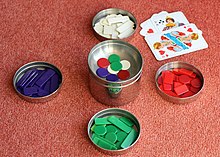
Napoleon or Nap is a straightforward trick-taking game in which players receive five cards each and whoever bids the highest number of tricks chooses trumps and tries to win at least that number of tricks. It is often described as a simplified version of Euchre, although David Parlett believes it is more like "an elaboration of Rams". It has many variations throughout Northern Europe, such as Fipsen. The game has been popular in England for many years, and has given the language a slang expression, "to go nap", meaning to take five of anything. It may be less popular now than it was, but it is still played in some parts of southern England and in Strathclyde. Despite its title and allusions, it is not recorded before the last third of the nineteenth century, and may have been first named after Napoleon III.

Schnapsen, Schnapser or Schnapsa is a trick-taking card game of the Bézique (Ace-Ten) family that is very popular in Bavaria and in the territories of the former Austro-Hungarian Empire and has become the national card game of Austria and Hungary. Schnapsen is both of the point-trick and trick-and-draw subtypes.

Tippen, also known as Dreiblatt, Dreikart, Drei Karten, Dreekort, Kleinpréférence or Labet, is an historical German 3-card, plain-trick game which was popular as a gambling game for three or more players. The Danish version of the game was known as Trekort and more elaborate Swedish variants include Knack and Köpknack. It appears to be related to the English game of 3-Card Loo. It was banned as a gambling game in some places.
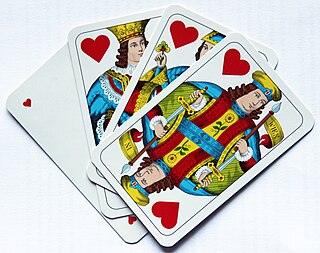
Préférence, frequently spelt Preference, is a Central and Eastern European 10-card plain-trick game with bidding, played by three players with a 32-card Piquet deck, and probably originating in early 19th century Austria, becoming the second most popular game in Vienna by 1980. It also took off in Russia where it was played by the higher echelons of society, the regional variant known as Preferans being still very popular in that country, while other variants are played from Lithuania to Greece.
Chratze is a trick taking card game, mainly played in the German-speaking part of Switzerland as well as in Bavaria. It is one of over 70 variants of Jass and played with a pack of 36 cards, either a Swiss-German or French one. It appears to be related to the Austrian game, Kratzen.

Bavarian Tarock or, often, just Tarock, is a card game that was once popular in Bavaria and also played in parts of Austria as well as Berlin. The name is a clue to its origin in the historical German game of [Gross-]Tarock, a game using traditional Tarot cards. At some point in the mid- to late-18th century, attempts were made to emulate Taroc using a standard 36-card German-suited pack, resulting in the formerly popular, south German game of German Tarok. During the last century, the variant played with a pot (Haferl) and often known as Bavarian Tarock or Haferltarock, evolved into "quite a fine game" that, however, has less in common with its Tarock progenitor. German Tarok also generated the very similar game of Tapp, played in Württemberg, and both are related to Bauerntarock, Dobbm and the American games of Frog and Six-Bid Solo. Bavarian Tarock should not be confused with Königrufen, also known as Austrian Tarock or just Tarock.

Dreierschnapsen, Talonschnapsen or Staperlschnapsen is a three-hand variant of the popular Austrian card game, Bauernschnapsen. The rules are very similar to those for Bauernschnapsen except that, instead of two teams of two players, one player bids to become the soloist against the other two who form a temporary alliance. Another difference is that the game makes use of a talon with which the soloist may exchange cards to improve his hand, hence its alternative name of Talonschnapsen. The game is usually played with William Tell cards.
Lampeln or Lampln is an old Bavarian and Austrian plain-trick card game that is still played in a few places today. It is one of the Rams group of card games characterised by allowing players to drop out of the current game if they think they will be unable to win any tricks or a minimum number of tricks.
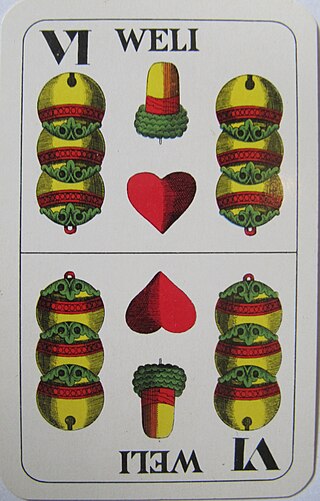
Mauscheln, also Maus or Vierblatt, is a gambling card game that resembles Tippen, which is commonly played in Germany and the countries of the old Austro-Hungarian Empire.

Mistigri, historically Pamphile, is an old, French, trick-taking card game for three or four players that has elements reminiscent of poker. It is a member of the Rams family of games and, although it is a gambling game, often played for small stakes, it is also suitable as a party game or as a family game with children from the age of 12 upwards.

Kratzen is an Austrian card game for three to six players that is played for small stakes usually using a 33-card William Tell pack. It is a member of the Rams group of card games characterised by allowing players to drop out of the current game if they think they will be unable to win any tricks or a minimum number of tricks. The game is related to the Swiss Jass form, Chratze and has been described as "fun" to play.

Lupfen is a card game for 3–5 players that is played mainly in west Austria and south Germany, but also in Liechtenstein. The rules vary slightly from region to region, but the basic game in each variation is identical. It is one of the Rams group of card games characterised by allowing players to drop out of the current game if they think they will be unable to win any tricks or a minimum number of tricks.

Norseman's Knock or Norrlandsknack is a classic Swedish card game for 3 to 5 players, known since the mid-1800s. It is traditionally played for money. The game is about winning as many tricks as possible and above all not being completely left without a trick.

Trekort, Tre-Kort or, in Swedish, also Trikort, is an old card game of Danish origin for four or five players that was usually played for money. It was also known in Sweden, where it developed into the variant of Knack. The name Trekort is also loosely used to describe related three-card games such as Swedish Köpknack. The name means "three cards" and may therefore be related to German Dreiblatt.

Svängknack is a Swedish card game for 6 to 8 players that is a further development of Knack and, like the latter, is mainly played for money.

Köpknack is an old Swedish card game which is a development of Knack and, like the latter, is mainly played for stakes. The game is also known as Trekort which, however, usually refers to a simpler version of Danish origin that may have been its progenitor.
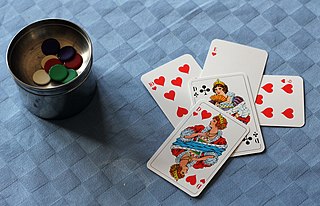
Femkort is a classic Swedish card game for 3 to 8 players "with an unusual object", known since the 17th century, being mentioned in 1658 in Georg Stiernhielm's epic poem, Hercules (Herkules) as Fämkort. It is traditionally played with some kind of bet.

Losing Lodam is an historical English card game for three or more players. It is a 'negative' game like Hearts whereby the aim is to avoid taking tricks with certain cards known as loaders.
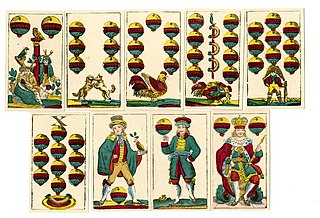
Kauflabet or Kauf-Labet is an historical German trick-taking card game for three to five players that was popular within women's circles.

Sjavs is a Danish card game of the Schafkopf family that is played in two main variants. In Denmark, it is a 3-player game, played with a shortened pack of 20 cards; in the Faroe Islands, where it is very popular, it is a four-hand, partnership game using a standard Piquet pack of 32 cards.
